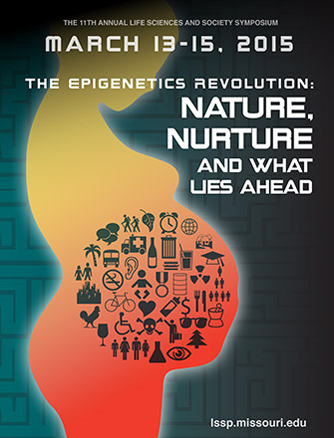
How do people’s genes influence their behavior, health and the culture in which they live?
Learn more about the emerging science of epigenetics March 13–15 at the Life Sciences and Society Symposium in Bond Life Sciences Center’s Monsanto Auditorium.
This year’s symposium, called “The Epigenetics Revolution: Nature, Nurture and What Lies Ahead,” will look at the science of epigenetics and how things like environment, stress, social trauma and diet affect gene expression. Diet? One of the lectures is called “You Are What Your Father Ate.”
Though no tickets are required, free online registration is encouraged.
Symposium presenters include:
- Annie Murphy Paul, science writer and author of Origins: How the Nine Months before Birth Shape the Rest of Our Lives. Her lecture is called “Sharing Epigenetic Research with the Public.” She will talk about new findings in epigenetics. 6:30 p.m. Friday
- Tracy Bale, professor of neuroscience and animal biology at the University of Pennsylvania. Bale will present “Stress Parents: Maternal and Paternal Epigenetic Programming of the Developing Brain.” Using mouse models to study the development of human neuropsychiatric diseases, Bale will discuss schizophrenia and autism and how parental lifetime exposure to stress, infection and malnutrition can contribute to neurodevelopmental disorders. 9 a.m. Saturday
- Oliver Rando, professor of biochemistry and molecular pharmacology at the University of Massachusetts Medical School. Rando will present “You Are What Your Father Ate.” Using genomic tools to study intergenerational epigenetic effects, his work focuses on the effect of a father’s diet on offspring genes and behavior. 10:30 a.m. Saturday
- Irva Hertz-Picciotto, professor of public health sciences at the University of California–Davis. Hertz-Picciotto will present “Environment and Autism: Past Evidence, Current Research and Future Quandaries.” An environmental epidemiologist, Hertz-Picciotto focuses on how environmental toxins can effect human disease. 2:15 p.m. Saturday
Learn more about symposium speakers and view the complete schedule.
Another lecture March 17:
• Sir Michael Rutter, professor of developmental psychology at the Institute of Psychiatry in King’s College, London, will present “Profound Global Institutional Deprivation: The Example of the English and the Romanian Adoptee Study.” Discussion will focus on the English and Romanian Adoptee (ERA) project, an investigation of the development of a random sample of Romanian children, most of whom spent their early lives in severely deprived institutional settings and how they changed behaviorally after adoption. 3:30 p.m., Tuesday, Jesse Wrench Auditorium, Memorial Union, MU Campus
Genes Exhibit:
- Generations: Reproduction, Heredity and Epigenetics, monthlong exhibit, Ellis Library Colonnade, Ellis Library, MU Campus